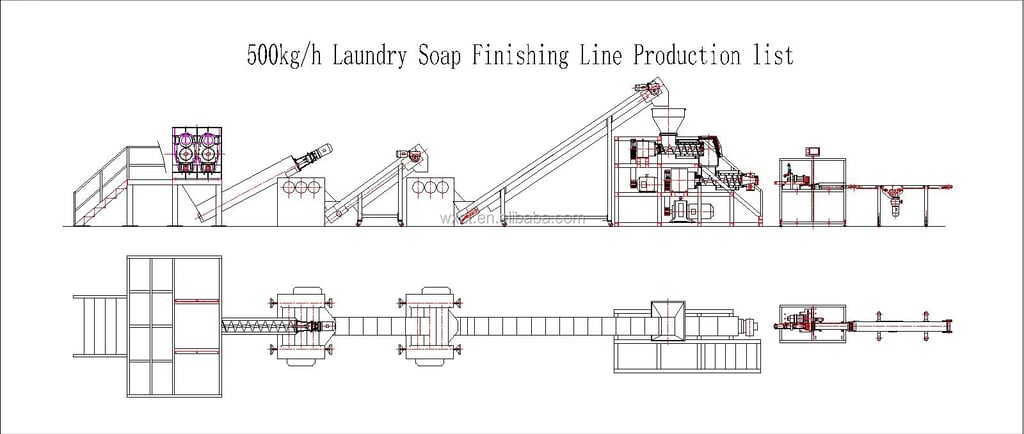The Future of Sustainable Manufacturing: Exploring Soap Making, Biomass, and Pellet Production Machines
3/28/20253 min read


Soap Making Machine: The Backbone of Laundry Soap Production
In the world of hygiene and cleanliness, soap is an essential commodity. The production of soap, especially in large quantities, requires advanced soap-making machines. These machines streamline the process by efficiently mixing raw ingredients, saponifying oils, and molding bars of soap with precision.
1000kg/h Laundry Soap Production Line: High Efficiency for Mass Production
A 1000kg/h laundry soap production line is designed for large-scale manufacturing. With a high output rate, it caters to commercial and industrial needs. The process involves several stages:
Oil Saponification – Converting fats and oils into soap through chemical reactions.
Mixing and Refining – Ensuring even distribution of additives and fragrances.
Extrusion and Stamping – Forming soap bars into desired shapes.
Drying and Packaging – Preparing finished products for distribution.
These machines provide an eco-friendly solution by optimizing raw material usage and reducing waste.
Wood Pellet Mill: Transforming Waste into Energy
Wood pellet mills have become a crucial element in biofuel production. They convert raw wood materials into dense pellets, which are used as an alternative fuel source. The advantages of wood pellet mills include:
Renewable energy source
Lower carbon footprint
High energy efficiency
Versatile applications in heating and industrial processes
Biofuel Pellet Line: The Key to a Sustainable Future
A biofuel pellet line is a complete system for processing biomass into fuel. It consists of several essential components:
Raw Material Handling – Collection and preparation of biomass materials.
Crushing and Grinding – Ensuring uniform size for pellet formation.
Drying Process – Reducing moisture content for better combustion.
Pelletizing and Cooling – Compacting biomass into high-density pellets.
Packing and Storage – Making pellets ready for distribution.
The global shift towards renewable energy makes biofuel pellet lines an attractive investment for businesses.
Wood Chipper: The First Step in Biomass Processing
A wood chipper is vital in breaking down large wooden materials into manageable pieces. It serves as the primary stage in biofuel and pellet production. High-quality wood chippers offer:
Fast and efficient wood processing
Consistent chip size
Lower operational costs
Enhanced durability
Wood Grinder Machine: Refining Raw Materials
After chipping, wood grinders further reduce the material into fine particles. A wood grinder machine ensures:
Uniform particle size for better pelletization
Efficient energy consumption
Versatility in processing different wood types
Crushing Machine: The Foundation of Material Processing
A crushing machine plays a crucial role in breaking down materials such as wood, biomass, and even minerals. The benefits include:
Improved efficiency in material processing
Enhanced output quality
Lower labor costs
Biomass Drying Machine: Enhancing Fuel Quality
Biomass drying machines remove excess moisture from raw materials before pelletization. Key advantages:
Higher combustion efficiency
Reduced smoke emissions
Increased pellet durability
Charcoal Machine: Converting Waste into Profitable Products
Charcoal machines transform organic waste into charcoal, an excellent fuel source. The process includes:
Carbonization – Burning biomass under controlled conditions.
Cooling and Screening – Ensuring high-quality charcoal.
Packaging for Market – Ready-to-use charcoal for cooking and industry.
Feed Pellet Machine: Revolutionizing Animal Nutrition
Feed pellet machines process grains and other nutrients into compact pellets for animal consumption. The benefits include:
Better digestibility for livestock
Improved storage and transportation
Customizable nutrition profiles
Pellet Line Accessory Equipment: Supporting Optimal Production
Every pellet production line requires additional equipment for seamless operation, such as:
Conveyors for material transport
Cooling systems for temperature control
Dust collection for environmental safety
Pellet Mill Parts: Essential Components for Maximum Efficiency
Pellet mill parts like rollers, dies, and gears ensure the longevity and performance of the machinery. Regular maintenance and high-quality components enhance productivity.
Packing Machine: Ensuring Market-Ready Products
A packing machine is crucial for sealing and packaging finished products. It enhances:
Shelf life and protection
Brand presentation
Efficiency in distribution
Mixing Machine: Homogenizing Ingredients
In both food and industrial production, mixing machines ensure consistency in product quality. These machines improve:
Ingredient integration
Processing efficiency
Final product uniformity
Food Processing Machine: Bridging Technology and Nutrition
Food processing machines are revolutionizing the industry by improving:
Nutritional value retention
Production speed
Waste reduction
Conclusion: Embracing Innovation for a Greener Tomorrow
The integration of these machines in various industries is shaping a more sustainable future. Whether it’s in soap manufacturing, biomass energy production, or food processing, technological advancements continue to enhance efficiency and environmental responsibility. Investing in these machines is not just a business decision—it’s a commitment to sustainability and progress.
